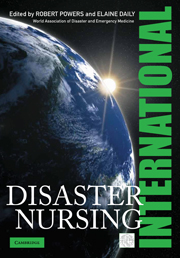Book contents
- Frontmatter
- FOREWORD I
- FOREWORD II
- Contents
- CONTRIBUTORS
- PREFACE
- ACKNOWLEDGMENTS
- CHAPTER 1 INTRODUCTION TO DISASTERS AND DISASTER NURSING
- CHAPTER 2 HEALTHCARE FACILITY PREPAREDNESS
- CHAPTER 3 COMMUNITY BEHAVIOR AND RESPONSE TO DISASTER
- CHAPTER 4 FIRST RESPONDERS
- CHAPTER 5 DISASTER TRIAGE
- CHAPTER 6 HOSPITAL IMPACT: EMERGENCY DEPARTMENT
- CHAPTER 7 HOSPITAL IMPACT: IMMEDIATE ISSUES
- CHAPTER 8 HOSPITAL IMPACT: LONG-TERM ISSUES
- CHAPTER 9 HOSPITAL IMPACT: INTERNAL DISASTERS
- CHAPTER 10 HEALTHCARE FACILITIES INCIDENT COMMAND
- CHAPTER 11 CHEMICAL PREPAREDNESS AND RESPONSE
- CHAPTER 12 BIOLOGICAL PREPAREDNESS AND RESPONSE
- CHAPTER 13 EMERGENCY MANAGEMENT OF RADIATION INJURIES AND ILLNESSES
- CHAPTER 14 EXPLOSIVE EVENT PREPAREDNESS/RESPONSE
- CHAPTER 15 DECONTAMINATION
- CHAPTER 16 POPULATIONS WITH VULNERABILITIES AND SPECIAL NEEDS
- CHAPTER 17 DISASTERS AND CHILDREN
- CHAPTER 18 REGIONAL PLANNING
- CHAPTER 19 US FEDERAL RESOURCES AND RESPONSE
- CHAPTER 20 INTERNATIONAL DISASTER RESPONSE
- CHAPTER 21 DISASTER NURSING RESPONSES IN JAPAN
- CHAPTER 22 PREPAREDNESS OF THE ISRAELI HEALTH SYSTEM FOR EMERGENCIES
- CHAPTER 23 PUBLIC HEALTH RESPONSE
- CHAPTER 24 PANDEMIC PLANNING
- CHAPTER 25 HEALTH ISSUES IN HUMANITARIAN EMERGENCIES
- CHAPTER 26 DISASTER MENTAL HEALTH
- CHAPTER 27 DISASTER ETHICS
- CHAPTER 28 DISASTER RECOVERY
- CHAPTER 29 THE SOUTHEAST ASIA TSUNAMI: HEALTH ASPECTS
- CHAPTER 30 HURRICANE KATRINA: HEALTH ASPECTS
- CHAPTER 31 DISASTER NURSING EDUCATIONAL COMPETENCIES
- CHAPTER 32 DISASTER NURSING RESEARCH
- CHAPTER 33 DISASTER RESEARCH FRAMEWORK
- INDEX
CHAPTER 32 - DISASTER NURSING RESEARCH
Published online by Cambridge University Press: 02 December 2010
- Frontmatter
- FOREWORD I
- FOREWORD II
- Contents
- CONTRIBUTORS
- PREFACE
- ACKNOWLEDGMENTS
- CHAPTER 1 INTRODUCTION TO DISASTERS AND DISASTER NURSING
- CHAPTER 2 HEALTHCARE FACILITY PREPAREDNESS
- CHAPTER 3 COMMUNITY BEHAVIOR AND RESPONSE TO DISASTER
- CHAPTER 4 FIRST RESPONDERS
- CHAPTER 5 DISASTER TRIAGE
- CHAPTER 6 HOSPITAL IMPACT: EMERGENCY DEPARTMENT
- CHAPTER 7 HOSPITAL IMPACT: IMMEDIATE ISSUES
- CHAPTER 8 HOSPITAL IMPACT: LONG-TERM ISSUES
- CHAPTER 9 HOSPITAL IMPACT: INTERNAL DISASTERS
- CHAPTER 10 HEALTHCARE FACILITIES INCIDENT COMMAND
- CHAPTER 11 CHEMICAL PREPAREDNESS AND RESPONSE
- CHAPTER 12 BIOLOGICAL PREPAREDNESS AND RESPONSE
- CHAPTER 13 EMERGENCY MANAGEMENT OF RADIATION INJURIES AND ILLNESSES
- CHAPTER 14 EXPLOSIVE EVENT PREPAREDNESS/RESPONSE
- CHAPTER 15 DECONTAMINATION
- CHAPTER 16 POPULATIONS WITH VULNERABILITIES AND SPECIAL NEEDS
- CHAPTER 17 DISASTERS AND CHILDREN
- CHAPTER 18 REGIONAL PLANNING
- CHAPTER 19 US FEDERAL RESOURCES AND RESPONSE
- CHAPTER 20 INTERNATIONAL DISASTER RESPONSE
- CHAPTER 21 DISASTER NURSING RESPONSES IN JAPAN
- CHAPTER 22 PREPAREDNESS OF THE ISRAELI HEALTH SYSTEM FOR EMERGENCIES
- CHAPTER 23 PUBLIC HEALTH RESPONSE
- CHAPTER 24 PANDEMIC PLANNING
- CHAPTER 25 HEALTH ISSUES IN HUMANITARIAN EMERGENCIES
- CHAPTER 26 DISASTER MENTAL HEALTH
- CHAPTER 27 DISASTER ETHICS
- CHAPTER 28 DISASTER RECOVERY
- CHAPTER 29 THE SOUTHEAST ASIA TSUNAMI: HEALTH ASPECTS
- CHAPTER 30 HURRICANE KATRINA: HEALTH ASPECTS
- CHAPTER 31 DISASTER NURSING EDUCATIONAL COMPETENCIES
- CHAPTER 32 DISASTER NURSING RESEARCH
- CHAPTER 33 DISASTER RESEARCH FRAMEWORK
- INDEX
Summary
RESEARCH THAT UNDERPINS and reports disaster healthcare practices is growing rapidly. However, conducting scientific research in this area is ethically and practically both complex and difficult. Thus, it is not surprising that the collection of research data during disasters often is not a priority for responding healthcare professionals. The majority of research concerning health planning, response, and recovery from a disaster is descriptive of the situation either before or after the event. Achieving evidence-based practice requires that disaster healthcare professionals seek new ways to understand the health aspects of a disaster and to evaluate their practice, both within and beyond the relief phase, and both in real time and retrospectively. Of course, some disaster-related problems only can be researched at certain times, such as with post-traumatic mental health issues and the responses of both individuals and entire communities to a disaster. There is considerable opportunity and need for research that contributes to the science of disaster health care and supports the way that we prepare for and respond to the health aspects of a disaster. The challenge is to develop research approaches that ensure robust findings and allow us to compare findings across studies, across events, and across societies, in an effort to improve the quality of the evidence that supports our practice.
- Type
- Chapter
- Information
- International Disaster Nursing , pp. 561 - 582Publisher: Cambridge University PressPrint publication year: 2010



